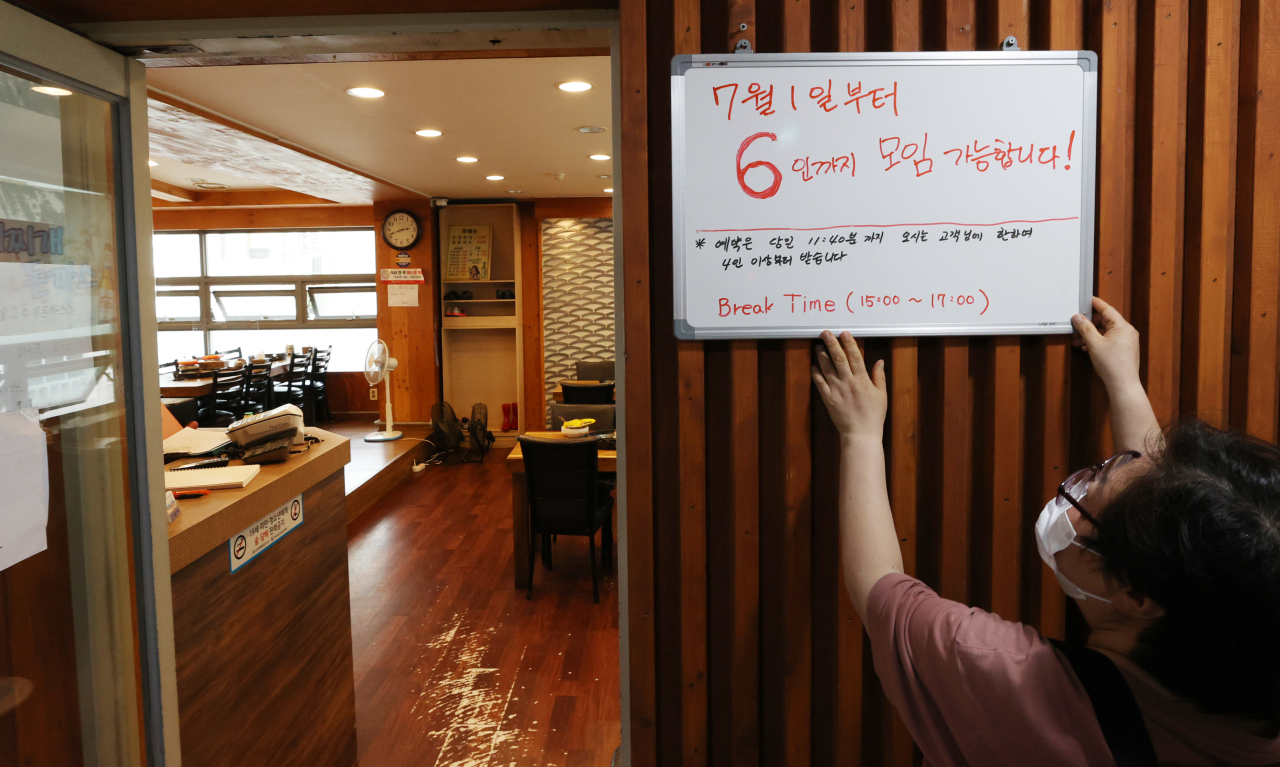 |
An employee puts up a sign at a restaurant in Seoul on Monday, to inform customers that gatherings of up to six people are allowed starting Thursday under the eased social distancing rules amid the coronavirus pandemic. Under the new Level 2 distancing, the ban on gatherings of five or more people will be eased to six people until July 14 in the greater Seoul area after which the ceiling will go up to eight. (Yonhap) |
South Korea's daily new virus cases remained in the 500s for the second day in a row Tuesday on fewer tests, but the loosened vigilance against the pandemic may trigger a further rise in new infections amid a steady increase in cases of COVID-19 variants.
The country reported 595 more COVID-19 cases, including 560 local infections, raising the total caseload to 156,167, the Korea Disease Control and Prevention Agency (KDCA) said. The latest figure was up 94 from the previous day.
The country added two more deaths, raising the death toll to 2,017. The fatality rate was 1.29 percent.
The daily caseload may rise down the road amid increased activities and loose antivirus measures.
A set of revamped distancing rules will be implemented next month as the country's vaccination program gathers pace.
Under the loosened rules, restaurants and cafes will be allowed to open till midnight from the current 10 p.m., and bars and other nightlife facilities will also resume their operations.
The ban on gatherings of five or more people is to be lifted to six people until July 14 in the capital area before the limit will be extended to eight.
No restrictions will be placed on other areas after the first two weeks of next month.
The eased rules will be put into place as a rising number of variant cases are threatening the country's virus fight.
Ahead of the implementation of the eased rules, health experts expressed concerns over the possible surge in new cases, as people in their 20s to 50s have yet to be inoculated amid a steady rise in new variant cases.
To contain the spread of the virus in the greater Seoul area, virus-prone facilities in the area will be under enhanced scrutiny for two weeks till July 14, including zero-tolerance against violators, amid eased social distancing measures.
During the previous week, 267 confirmed cases of variants from the countries were reported, with the total of confirmed cases of variants coming to 2,492.
Health officials said they have been tracking the infection routes of confirmed cases of the super-contagious Delta strain from India as the spread of the variant started to proliferate in the greater Seoul area.
A total of 15.34 million people, or 30 percent of the country's 51.3 million population, have received their first shots of COVID-19 vaccines since the country started its vaccination program on Feb. 26. The KDCA said 4.76 million people have been fully vaccinated.
South Korea is trying to inoculate 36 million people by September to achieve herd immunity in November, but it hopes it can reach the goal earlier than expected with the increased vaccine rollout.
The country currently uses vaccines from AstraZeneca, Pfizer, Moderna and Janssen.
Of the newly confirmed domestic cases, the capital area accounted for 75 percent, with 201 from Seoul, 228 from Gyeonggi Province and 17 from Incheon, 40 kilometers west of the capital.
There were 35 additional imported cases, up five from a day earlier, raising the total to 9,882.
Of the newly confirmed cases from overseas, 18 came from Indonesia, followed by Russia with four.
The health authorities said arrivals from India, Indonesia, Pakistan and the Philippines will not be allowed to skip a mandatory 14-day quarantine even if they are vaccinated, to keep the global spread of the highly contagious Delta variant in check.
The country earlier announced its plan to allow arrivals who have been vaccinated abroad to enter South Korea without going through self-isolation starting next month.
The number of patients in serious or critical condition came to 152, up 11 from the previous day.
The total number of people released from quarantine after making full recoveries was 147,077, up 402 from a day earlier, with 7,073 people being isolated for COVID-19 treatment. (Yonhap)





![[Exclusive] Hyundai Mobis eyes closer ties with BYD](http://res.heraldm.com/phpwas/restmb_idxmake.php?idx=644&simg=/content/image/2024/11/25/20241125050044_0.jpg)
![[Herald Review] 'Gangnam B-Side' combines social realism with masterful suspense, performance](http://res.heraldm.com/phpwas/restmb_idxmake.php?idx=644&simg=/content/image/2024/11/25/20241125050072_0.jpg)

